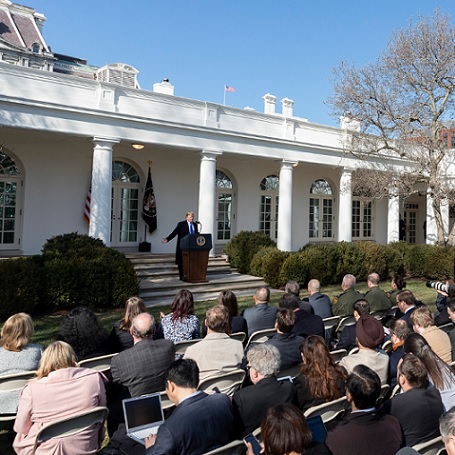
Today President Trump did decide to declare a national emergency regarding the southern border of the United States.
In declaring a national emergency, the president gets more leeway to move money in order to construct a wall on the southern border, he says.
In declaring a national emergency, the president gets more leeway to move money in order to construct a wall on the southern border, he says.
This triggered a huge reaction on both right and left, for a variety of reasons. The left instantly promised legal challenges. The conservative right again lamented the imperial presidency. The Republican right cheered the president’s motives, if not his methods.
While I despise the use of executive action more than most, the outsized reaction to President Trump’s reaction was more than a little puzzling. After all, we currently have 32 active national emergency declarations, including today’s. Yes, you read that right. THIRTY-TWO. And the oldest active one on record is nearly as old as I am! That would be Carter’s national emergency in 1979, which froze Iranian assets during the Iran hostage crisis. Once the hostages were freed, shouldn’t the national emergency have ended? And if it is still important to keep Iranian assets frozen – and we’re now approaching 40 years since the hostage crisis – shouldn’t Congress pass a law?
Bill Clinton declared 17 national emergencies, six of which remain active today. These include national emergencies about WMDs, drug cartels using American companies to launder their money, a trade embargo with Sudan, and imposing sanctions on Middle East terror groups like Hamas and Hezbollah. Remember, these national emergencies must be renewed annually by the President. Bill Clinton has been out of office for over 20 years. Shouldn’t Congress have passed a law by now?
George W. Bush declared 12 national emergencies, some relating to the War on Terror. Ten are still active, including economic sanctions on Syria, Belarus, the Democratic Republic of the Congo, restrictions on North Korea, and protections of Iraq and Lebanon. If these countries are still needing this level of attention by declaration of national emergency, shouldn’t Congress have passed a law by now?
Barack Obama declared 13 national emergencies, 11 of which are still active today. Stopping Somali pirates, imposing sanctions on Libya, sanctions on South Sudan, sanctions against Russia over their invasion of Ukraine, sanctions on specific individuals in Burundi and the Central African Republic and Venezuela, and sanctions against cyberterrorists are all included. Have you heard of any of these national emergencies before today? And why hasn’t Congress passed any laws regarding these issues by now?
And believe it or not, this is not President Trump’s first declared national emergency. It’s not his second one, either. Nope, Trump has issued FOUR national emergency declarations up to this point. Did you hear about any of the previous three before? The first imposed sanctions in Myanmar, the second addressed foreign interference in national elections (really? Yes, really), and the third involved sanctions against certain individuals in Nicaragua.
And now, a national emergency to build a wall.
Exactly what the hell has Congress been DOING for the last 40 years, other than stuffing omnibus bills with loads of pork and living it up in the Acela corridor???
But back to the wall, and the money to fund it. Thanks to an informative thread by Senator Mike Lee’s communications director Conn Carroll, we can actually see that not all of the money is going to come from this national emergency declaration.
Carroll then points out that the money is due to be spent “sequentially,” so the money from the national emergency declaration would be spent last. Which helps, because the Democrats may challenge the national emergency designation in the courts. But by then, if Carroll’s numbers are correct, we’re already $5 billion in to building a wall – including whatever money was in the omnibus bill that is supposed to go to “bollard fencing.”
So, here are my two takeways from today’s national emergency:
1) The threat that a Democrat president would use it to deal with guns, or climate change, or whatever progressive idea floats into their head? Every president since 1976 has had the power to declare a national emergency on pretty much whatever the hell they want. This is just the first time that anyone cared to pay attention to what a “national emergency” actually is – and it’s whatever a president decides it is.
1) The threat that a Democrat president would use it to deal with guns, or climate change, or whatever progressive idea floats into their head? Every president since 1976 has had the power to declare a national emergency on pretty much whatever the hell they want. This is just the first time that anyone cared to pay attention to what a “national emergency” actually is – and it’s whatever a president decides it is.
2) Maybe Congress should GET OFF THEIR COLLECTIVE ASSES and PASS LAWS to deal with all these issues that apparently are being governed by national emergency declarations. They ARE the legislative arm of government, after all. Shouldn’t they actually… legislate and represent the people who sent them there? Or maybe even reform the National Emergency Act itself? Or is everyone good with the Executive Branch holding a lot more power than the Founders ever intended?

No comments:
Post a Comment